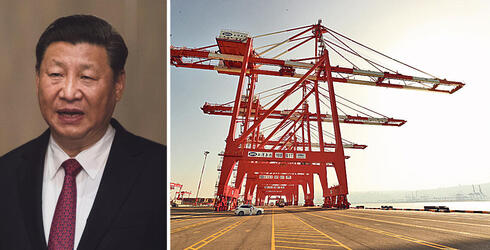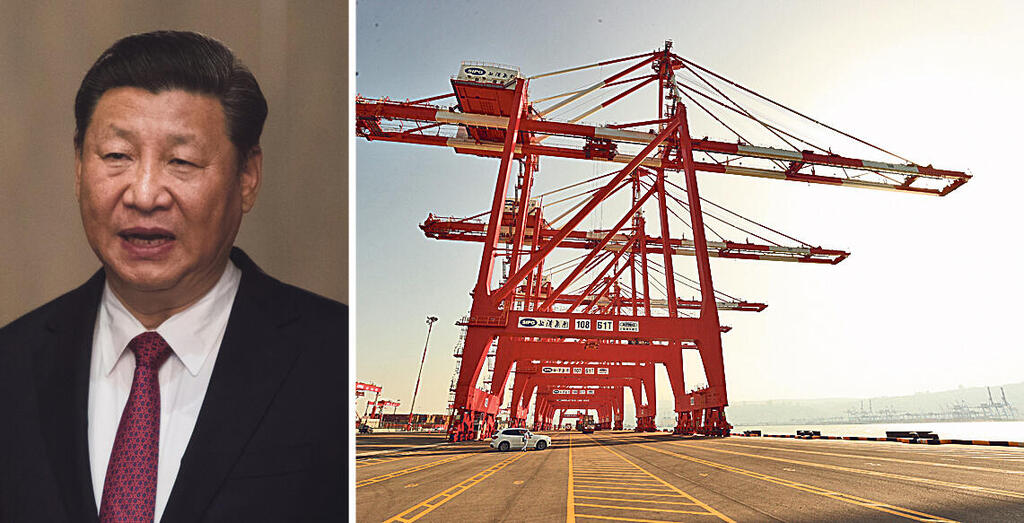
Analysis
"When the time is right, China may be able to stop the operations of critical infrastructures in Israel"
The hostile attitude of the Chinese government towards Israel since the outbreak of the war with Hamas led to a demand from the Knesset's Foreign Affairs and Defense Committee to discuss the extensive Chinese holdings in the country's infrastructure
Is China's deep presence within the Israeli economy beginning to pose a danger? Calcalist received a letter sent to the chairman of the Knesset's Foreign Affairs and Defense Committee, Yuli Edelstein, in which there is a demand to hold an urgent discussion regarding China's holdings in infrastructure projects in Israel. The main reference is to the dock at Haifa Port which is managed and operated by a Chinese company, but other holdings are also mentioned.
"Despite warnings from the security establishment, in the last decade, the Chinese government has invested extensively in strategic assets in Israel," Dr. Harel Menashri writes in the letter. Menashri is one of the founders of the cyber unit at the Shin Bet and is currently the head of the Cyber Faculty and a senior lecturer at HIT, Holon Institute of Technology. According to him, his concerns began even before October 7, but they have increased since then and in his opinion are not receiving enough attention, even though China is radicalizing its positions towards Israel.
1 View gallery


Chinese president Xi Jinping, port in Haifa owned by Chinese company SIPG
(Photo: AFP, Elad Gershgorn)
"The disaster we experienced on October 7 taught us to heed the warnings of the security establishment and I would like to warn of a similar situation. When it decides the time is right, China may be able to stop the operations of critical infrastructures in Israel."
Menashri also adds that components made in China that are integrated into the police's "Hawk Eye" system have been blacklisted in the U.S. "In the reality that has arisen, Israel must hedge the risks and make orderly and systematic decisions - what can be done with China and what can not. China is an important country, but there are products from China that should not be used by Israel," adds Menashri.
Menashri’s words reinforce American opposition in the past to China's entry into a port in Israel, which also included a statement that the Sixth Fleet would no longer dock at the port.
What exactly does Israel get from China? Beyond the presence in strategic infrastructures, including the light rail that was built mostly by a Chinese company, the trade relations between the two countries are very developed. In 2022, the volume of trade between the two countries amounted to $17.6 billion, not that far from the U.S., with which the volume of trade was $22 billion.
Relations with China are expanding, with a 17% increase in 2022 on the back of a 27% jump in 2021, according to CBS data, which do not include the trade in diamonds. The main increase is on the side of the import of Chinese goods to Israel, which jumped to $13 billion, while exports increased at a much slower pace to $4.5 billion. Most of the increase is not related to strategic assets, but to the popularity of retail sites, such as AliExpress and Shein. The growing popularity of Chinese vehicles also affected the data and Menashri fears that the fact that members of the security establishment travel in such vehicles also does not receive sufficient attention. Notably, China also holds a large stake in Israeli food giant Tnuva.
Dependence on oil from the Gulf
The concerns about the deepening of the Chinese presence in Israel are not new, but they have become more acute since the outbreak of the war, with Iran directing attacks at Israel from the north to the south, and also through the Houthis from Yemen. Until recently the main tension in regards to China stemmed from its trade war with the U.S. over recent years. However, the war in Gaza further clarified which countries are part of the "axis of evil" and raises a question regarding which camp China is in.
In recent years, at the same time as the increase in trade with Israel, China has discovered a new interest in the Middle East, which for it is more important than Israel - oil. If in the 1990s China met its own oil needs, then in recent years it has become the largest importer from Saudi Arabia and Iran. A third of the oil consumed by China comes from the Persian Gulf, and as a result its strategic interests have migrated there as well, wrote the New York Times a few days after the Hamas attack on October 7. China has become one of Iran's main trade partners, bypassing the economic sanctions imposed on Iran by the West. Last September, China purchased 87% of the oil exported by Iran.
Prime Minister Benjamin Netanyahu thought he could reduce Israel's dependence on the U.S. by cultivating new allies - Russia and China, just as he thought he could strengthen Hamas to weaken the Palestinian Authority. Russia's true face was revealed immediately after the Hamas attack, when President Vladimir Putin was among the leaders who did not condemn Hamas, and even hosted a delegation of the terrorist organization in Moscow. China, as usual, is more muted, but its position today is more pro-Palestinian. This is reflected both in the statements of the members of the Communist Party in China regarding the right of return and in joint activities with Russia at the UN in an attempt to block condemnation of the Hamas attack in the Security Council.
These are obvious things, alongside which there are "gray areas" where China is exerting its influence. This includes attempts to analyze the extent to which TikTok's algorithms, the social network that many forget is Chinese-owned, promote anti-Semitic and anti-Israel content. An investigation by the New York Times even found that China, Russia and Iran are conducting a campaign on social media in support of Hamas. Another development of the last few months is complaints raised by some industrialists in Israel about delays in receiving various electronic components, including those used by the defense industries. However, Israeli officials who live in China say that this is not something intentional, but that China itself is dealing with disruptions in cash flows and supply chains.
Control of TikTok content
"It is impossible to ignore the Chinese behavior in recent months, and relations with China have indeed changed, because it allows anti-Semitism on TikTok and does not condemn Hamas. However, China must not be viewed as a binary choice - either you are with the Chinese or against them. What is needed is for every government ministry to have training in everything regarding China or experts who know how to deal with the country, which is essentially opportunistic. It identifies opportunities and leverages them," says Carice Witte, founder and executive director of the Sino-Israel Global Network and Academic Leadership (SIGNAL) think tank, specializing in Israel-China relations.
"China is not a country that has 'friends' and it would be naive to think that we used to have good relations and now we don't. Everything in China is about interests, when they think that Israel is all about innovation and they can get it here, they will come, but in recent years the areas where China needs Israel have fallen in significance,” Witte explains. Its technological interest in Israel has diminished.
"What is important to China is the UN and its power there. They do not want to harm Israel and unlike Russia for example, China is oblique in how it cultivates and exercises influence in the world, but the goal is always about advancing its interests. What should worry Israel is that China will take advantage of us or harm us in order to promote interests. For example, the Chinese sell weapons to Iran and Turkey. China doesn't track if the weapons reach Gaza, but Israel should demand that they monitor where their military products go," she adds.
"The Chinese should be addressed behind closed doors and their interests should be identified wisely. For example, if there is an escalation in the north, oil prices will soar and this is a threat to China. Because of this, it is clear that they are talking to Iran and this is also in Israel's interest. We must not forget that China is a relatively new player in the international arena , therefore they are still learning the meanings of their actions."













